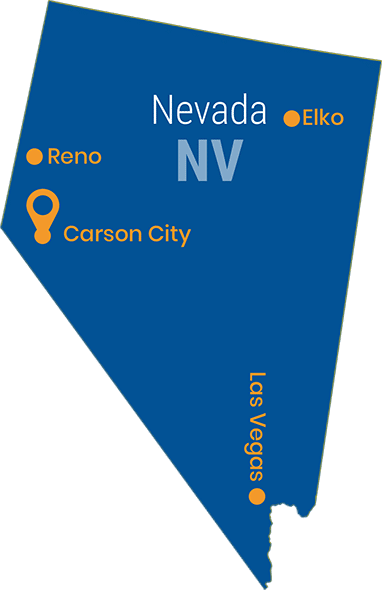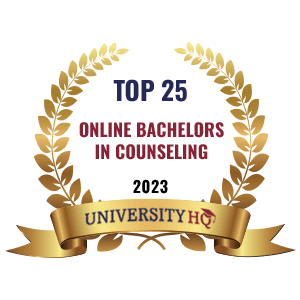What is School Counseling?
Nevada is a state that's known for many things. Most people may first think of it as the home to Las Vegas, one of the country's top tourist destinations. And that association is wholly warranted since the Nevada economy is led by its outstanding performance in this area. In fact, Nevada ranks 6th nationwide for this economic super sector that spans arts, entertainment, recreation, accommodation, and food services. That translates into $28 billion in annual revenue. The sector is also a huge employer, as over 400,000 people are needed to staff the world-class hotels, restaurants, and attractions. When one considers that most of this economic activity is generated in one small part of one city, The Strip, this feat is nothing short of astounding.
A school counselor is an education professional who focuses on the mental health and social well-being of students. They typically work in public schools, where they see students on an individual basis and help them overcome whatever may be holding them back from success in school. They may also arrange for group meetings for students with similar issues, such as LGBTQ students, students with disabilities, or students recovering from a similar sort of trauma, such as the loss of a loved one.
School counselors have at least a master’s degree and must be state licensed to conduct their profession. They undergo much of the same training as a mental health counselor, but they also have similar credentials to the teachers in their school. In fact, many school counselors these days may commute between campuses and serve several schools at once. Nevertheless, school counselors still enjoy the benefits of the school calendar, especially the summer and winter breaks. School counselors also must maintain their licensure to remain in good standing with their school district.

Featured Online Programs
Online School Counseling Education in Nevada
Coming in at a close second is Nevada's real estate industry, which generates $25 billion in annual revenue, ranking it 27th nationwide. Again, much of this revenue may come from that small part of Las Vegas, where high rollers enjoy luxury accommodations close to their favorite casinos and entertainment venues. The state's third strongest economic sector is professional and business services, which is ranked 29th nationwide on $19 billion in annual revenues. The fourth strongest industry in Nevada is its retail trade, which generates upwards of $12 billion in annual revenues and is ranked 30th in the United States.
While most of Nevada's top five strongest industries are surely benefiting from the strength of Las Vegas, as well as Reno, the fifth is an industry focused on supporting the people of the state in a different way. The education, healthcare, and social assistance sector brings in $11 billion annually and is ranked 34th in the nation. This includes teachers and school counselors, which are a vital part of what makes Nevada great.
State legislators are well aware of the importance education has in the life of their state. This is part of the reason that the state government funds the state's colleges, community colleges, and universities amply, with enough to support the very best instruction possible. In turn, faculties at each funded institution allocate the funds in such a way that they can attract and maintain the very best faculties possible.
Every educational professional needs to have a state license, whether they work in the classroom, administration offices, or counselor’s office. School counselors, in particular, are mandated to have at least a master’s degree in school counseling, if not a PhD. The stringent requirements are because school counselors need advanced training to conduct sessions with students.
During their undergraduate years, school counseling students often study a related field such as psychology, sociology, or social work, to name a few options. They might even enroll in a teacher preparation degree program. In fact, it may be wise to take a few courses in education to have a base knowledge of the profession and Nevada's rules surrounding it.
Online Associates (AS)
An associate school counseling degree may not be available at the community college level. This is because a master’s degree is required to practice the profession. However, students may take these two years to form a strong academic background that leads to their desired profession. Students may choose an associate degree in addiction counseling, early childhood education, or psychology, for instance. Those fields can help students begin to get an understanding of the human psyche.
An associate degree from a Nevada community college can help students on their way to a career in school counseling. They may take their degree and land an entry-level position with a school, perhaps in the administration offices or as a teacher's aide. Either option can provide a terrific background for later work. Many schools prefer to hire school counselors who have experience working with children in the school environment.
Online Bachelors (BS)

Though undergraduate degree programs don't include school counseling, students who earn a bachelor’s degree in psychology, addiction counseling, or social work are well on their way to success as a school counselor. Bachelor’s degree students who desire a career as a school counselor should start investigating the admissions requirements for a school counseling master’s degree program. Certain psychology courses are sure to be desired, as well as education or social work courses.
Students who complete their bachelor’s degree can find work in a school system as a teacher, teacher's aide, or on the administration support staff. It may even be helpful to seek out work as a substitute teacher, even if you didn’t earn a teaching degree. This way, you can gain more insight into the realities of working in a school. This experience will be better informed if you can land a long-term substitute teaching position, perhaps for a teacher taking maternity leave. Note that aspiring school counselors should strive to gain any and all possible in-school experience with the age group they intend to work with in their careers.
Find Your School Counseling Program
Online Masters (MS)

Students must complete their master’s school counseling degree to practice in their desired field. Often, master’s degree students are found in a Master of Education degree program that offers a special track for school counseling, or they enroll in a dedicated school counseling degree program. Either may be acknowledged by a state regulatory body or the Department of Education. Students should note that the Nevada Board will require them to be nationally certified by the National Board for Certified Counselors.
Students in a master’s school counseling degree program often undergo rigorous training in their profession including internships and other experiential learning. Upon graduating from a master’s counseling degree program, Nevadan students often must complete a 600-hour practicum in a school setting. Thankfully, most master’s school counseling degree programs are aligned with the Nevada Board of Education's rules and regulations such that any student should graduate with the requisite coursework and experiential learning credits under their belt.
Those earning a master's degree can also specialize their counselor or related educational programs on whatever type of counselor education most interests them. This includes options such as clinical mental health counseling, human services, school psychology, family counseling or couples counseling, etc.
Online Doctorate (PhD)
Though not necessary to become a school counselor in Nevada, a doctorate can be a help to any counseling professional, including school counselors. Not only do PhD level school counselors enjoy elevated status in their professional lives but they tend to receive higher salaries, too. This is because the Board of Education rewards professionals who earn advanced degrees. Master’s level school counseling professionals are already on a higher pay scale than teachers with a bachelor’s degree, so PhD counselors are some of the top paid professionals in the education system.
Professionals with a PhD also have an easier time if they decide to move into the private sector. As counseling professionals, they can charge insurance agencies more per hour and their status as PhDs helps them to attract clients. A PhD may also open the doors to teaching at the college or university level.
Become a School Counselor in Nevada
Like every other education professional, school counselors are required to satisfy certain requirements before they can practice in the state of Nevada. The reasoning behind this is clear: the people of Nevada want reassurances that their children are in the hands of highly qualified professionals. The state Board has devised a licensure system whereby every school counselor is tested and qualified for work. It should be noted that Nevada's requirements are not totally unique, but every state does create its own rules, so students should ensure that they are following the Nevada rules for licensure rather than the rules of any other state if they intend to work in Nevada.
To become a school counselor, students should first complete an undergraduate degree program that will qualify them for an appropriate master’s school counseling degree program. Often, undergraduate students will study psychology or social work, but other degrees may be accepted, provided that each student's transcript reflects certain courses, such as Human Development or Research Methods. Admissions standards will vary and may also include satisfactory GRE scores. Admissions officers also prefer when applicants have experience working in schools, or in some other capacity, with children the age that they intend to focus on for their career.
During their master’s degree program, Nevada's master’s school counseling degree students should make sure that they take certain courses to please the Board of Education.
They will need to take courses that can include, but are not limited to the following topic areas:
- individual counseling
- group counseling
- testing and educational assessments
- legal and ethical issues in counseling
- career counseling
- multicultural counseling
- exceptional children
- human development
- substance abuse counseling
The Nevada Board also requires that school counselors hold a credential from the National Board for Certified Counselors. Applicants for licensure also need 600 hours of practical experience in a school setting. This experience should ideally be with the student's target age group. The Board also requires that all aspiring school counselors pass the subject specific PRAXIS exam for school counseling.
Naturally, aspiring school counselors should gather letters of recommendation and be prepared for a background check. School counselors who have had some legal troubles may want to address this issue and be prepared to show proof that they have satisfied all the court's requirements and are fully rehabilitated.
Potential Careers for School Counseling Graduates
- School Counselor
This profession requires a master’s school counseling degree from an accredited program. While each state has their own requirements, most ask that applicants complete a period of supervised counseling in a school setting. Applicants must also pass the appropriate PRAXIS exam. - Career Counselor
Career counselors in high schools help students make the best decisions for their lives. They may help students with testing or interviews that seek to narrow down each student's strengths and talents. College level career counselors often hold a master’s degree and spend a lot of time organizing job fairs that are tailored to specific degree programs in their school. - Marriage and Family Therapist
These therapists work exclusively with couples and families. They must hold a master’s degree in marriage and family therapy and a state license to practice one-on-one psychotherapy. Some mental health counselors integrate couples and family therapy into their practice but may need more training and credentials to attract clients. - Social Worker
Social workers can work with any level of education, but those with more advanced degrees are typically better paid and enjoy higher status in the community. Social workers who hold a master’s social work degree and who have completed their state's licensure requirements can work as Licensed Clinical Social Workers and practice psychotherapy with individuals or groups. - Substance Abuse Counselor
These counseling professionals work at a variety of degree levels. Those who have less than a master’s degree can earn state licensure in most states, but their credentials don't allow them to conduct one-on-one psychotherapy. Those with an undergraduate credential typically work in drug and alcohol rehabilitation centers. - Mental Health Counselor
These healthcare workers are licensed to practice psychotherapy with individual clients. To become a mental health counselor, professionals are required to complete a master’s counseling degree program, pass a professional exam, and complete a period of supervised counseling practice, among other requirements as dictated by their state regulatory agency. - Employee Assistance Program (ESP) Counselor
These counseling professionals must hold a master’s degree and state licensure to work with employees in distress. Most of these counselors will work from a remote location and often work with people experiencing an acute situation. They may focus on de-escalating a situation and then may refer the employee to a counselor in their local area. - Special Education Teacher
SPED teachers work in schools with students who need special attention for a variety of reasons. Some special education students have learning disabilities but are otherwise highly functioning and intelligent. Others may have mild to profound developmental delays, and others require special teaching practices because of blindness or because they are deaf. SPED teachers are better paid than others but must create detailed, in-depth Individual Education Plans (IEPs) for each of their students.
- Guidance Counselor
- Behavioral Disorder Counselor
- Social and Community Services Manager
- Psychologist
- Counselor in Private Practice
- Postsecondary Psychology Teacher
- Behavioral Disorder Counselor
- College Counselor
- Academic Advisor
- Community Service Coordinator
- Caseworker
- Mental Health Technician
- Juvenile Justice Counselor
Search All Programs
